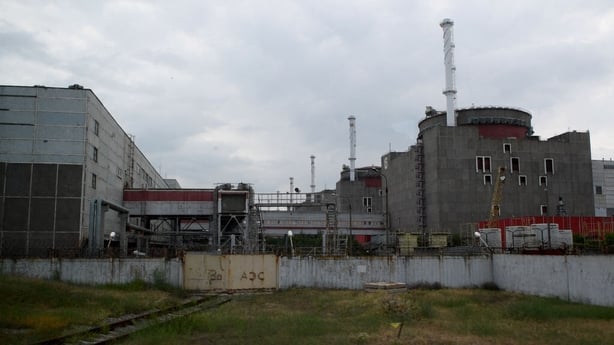Ukraine carried out a seaborne drone strike on a Russian navy ship at a Black Sea base, a security source has said, as Russia said it had repelled a similar attack over annexed Crimea.
The number of attacks in the sea has increased from both sides since Russia exited a deal last month that had allowed Ukrainian grain exports via the shipping hub during the conflict between the two countries.
In a video of the attack obtained by AFP, a naval drone is seen speeding towards the darkened silhouette of a military vessel before the connection abruptly cuts off.
A Ukrainian attack targeting the Olenegrorsky Gornyak landing ship in the Novorossiysk naval base in southern Russia was "succesful", a Ukrainian security source has said.
"The goal was to show that Ukraine can attack any Russian warship in that zone," the source added.

Russia said it had repelled an attempted attack on the base by the Ukrainian armed forces "with the use of two unmanned sea boats".
Russia's Black Sea Fleet has been targeted since the beginning of Moscow's military campaign in Ukraine more than a year ago, but attacks have increased in recent weeks.
"The presence of the Russian fleet in the Black Sea... will be put to an end," Ukrainian presidential aide Mykhailo Podolyak said on social media following the most recent drone strike.
"Ukraine will ensure freedom and security in the Black Sea for world trade," he added
The port of Novorossiysk also hosts the terminus of a pipeline that carries most Kazakh oil exports through Russia.
The fuel artery's operator Caspian Pipeline Consortium said it was continuing to ship oil to moored tankers at the terminal, Russian state media reported today.
Crimea attack
The Russian defence ministry meanwhile said it had downed 13 drones over the Crimean peninsula, without recording casualties or damage.
Crimea, annexed by Russia in 2014, has been targeted by Kyiv throughout Moscow's Ukraine offensive but has seen more intense attacks in recent weeks.
Ukrainian drone strikes on Crimea in July blew up an ammunition depot and damaged a strategic and symbolic bridge linking Russia's mainland to the peninsula.
Earlier this week, Russia's defence ministry said it foiled a Ukrainian drone attack targeting patrol boats in the Black Sea.
Three drones were trained on ships navigating in waters 340km southwest of Sevastopol, the base of Russia's Black Sea fleet in Crimea.
Also announced today was Russian Defence Minister Sergei Shoigu's visit to a combat zone in Ukraine to inspect a command post and meet senior military officers.
Mr Shoigu got an update on the situation on the front and "thanked commanders and soldiers... for successful offensive operations" in Lyman in eastern Ukraine, the army said, without mentioning when the visit took place.
Frontline under microscope
Mr Shoigu last visited the front at the end of June after an aborted rebellion by the Russian paramilitary group Wagner fighting along with Moscow's forces in Ukraine.
Ukraine began its long-awaited counteroffensive in the same month but has made modest advances in the face of stiff resistance from Russian forces on the front line.
Ukrainian President Volodymyr Zelensky said yesterday that the counteroffensive was difficult, reporting "very violent" fighting in the key areas on the eastern and southern fronts.

Late summer and early autumn 2022, Ukraine retook swathes of territory around Kherson and Kharkiv in rapid counteroffensives.
But Ukrainian forces are now contending with well-entrenched Russian defensive positions built over several months.
In the southern sector, Ukrainian troops were "gradually but persistently moving forward", deputy defence minister Hanna Malyar said on Telegram.
UN watchdog finds no mines on Zaporizhzhia reactor roofs
The UN nuclear watchdog has been granted access to areas of the Russian-held Zaporizhzhia nuclear power plant in southern Ukraine a month after requesting it, and has found no explosives, it said today in a statement.
On 4 July, Russia and Ukraine accused each other of planning to stage an attack on Europe's largest nuclear power plant, where the International Atomic Energy Agency (IAEA) has repeatedly warned of potential catastrophe from nearby military clashes.
A small IAEA team based at the plant sought to verify the accusations. It issued updates in the following weeks to say that it had found no signs of explosives in the areas it had been able to visit, except mines outside the perimeter that appeared to pose no danger to the plant's safety.

"(IAEA) experts have observed no mines or explosives on the rooftops of Unit 3 and Unit 4 reactor buildings and the turbine halls ... after having been given access yesterday afternoon," the IAEA said.
The IAEA said on 5 July that access to the roofs of the two units and parts of the turbine halls was essential. Ukraine's armed forces had said the day before that "operational data" showed "explosive devices" had been placed on those two roofs.
"Following repeated requests, the team had unimpeded access to the rooftops of the two reactor units and could also clearly view the rooftops of the turbine halls. The team will continue its requests to visit the roofs of the other 4 units," the statement said.
Ukraine accuses Russia of 'false flag' attack in Belarus
Meanwhile, the Security Service of Ukraine has accused Russia of preparing to stage a "false flag" attack at the Mozyr oil refinery in Belarus in order to blame Ukrainian saboteurs as part of an effort to draw Minsk into the war in Ukraine.
The attack, it said in a statement on the Telegram app, would be carried out by military and intelligence forces sent by Moscow to Belarus disguised as Wagner mercenaries who were exiled after staging a mutiny in Russia in June.

"Russia plans to accuse Ukraine of what they have done in order to try once again to draw Minsk into the full-scale war against our state," it said in a statement, without providing evidence.
It said its assertions were based on information obtained from several sources, including a captured Russian soldier.
Belarus is a close Kremlin ally and Moscow's forces used Belarusian territory as a staging ground for their abortive drive towards the Ukrainian capital of Kyiv at the beginning of their February 2022 full-scale invasion.
But Minsk's troops have not taken part in the war.
Fighters from Wagner, a Russian mercenary group, launched a mutiny against the Russian defence establishment in June and some of its fighters have since moved to Belarus under a deal. There was no immediate comment on the Ukrainian statement from Russia or Belarus.

